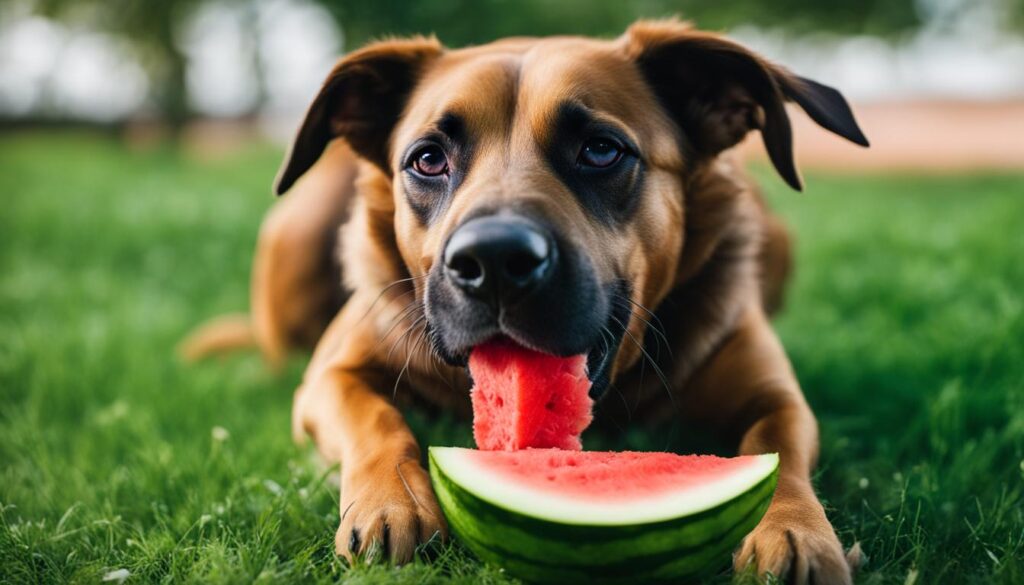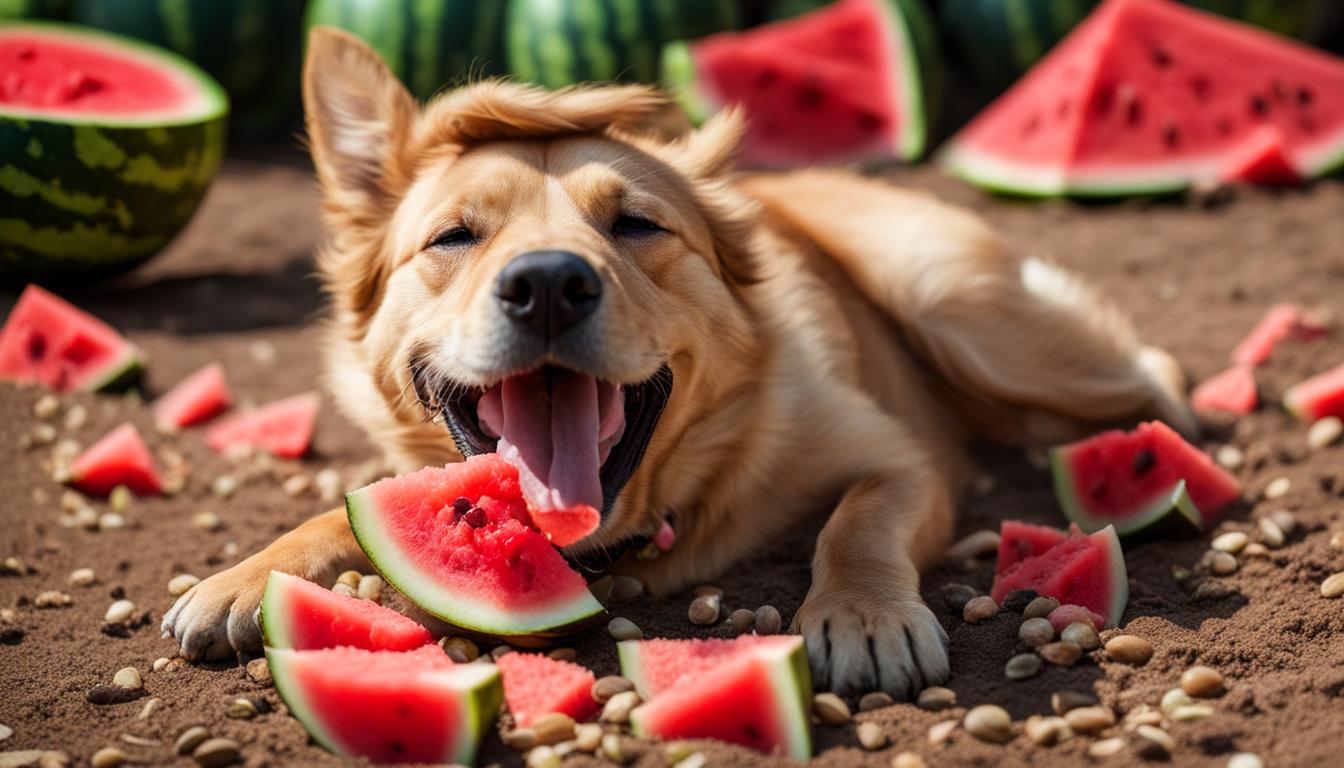When it comes to treating our furry friends, it’s always important to know which foods are safe for them to enjoy. One such summertime favorite that may have caught your eye is watermelon. But can dogs eat watermelon? Let’s dive in and explore the benefits of this juicy fruit for our canine companions.
First things first, let’s address the concerns about watermelon seeds and its rind. While the fruit itself is safe for dogs to consume, it’s crucial to remove the seeds and rind. These parts can potentially cause intestinal blockages and gastrointestinal upset. By doing so, you’ll ensure that your furry friend can savor this tasty treat without any worries.
So, what makes watermelon a great snack for dogs? For starters, it’s low in calories and packed with essential nutrients. With a whopping 92% water content, it’s also a hydrating option, especially during hot summer days. Plus, it contains vitamins A, B6, and C, as well as potassium. On top of that, it’s fat-free and cholesterol-free, making it a healthy choice for your four-legged companion.
Key Takeaways:
- Watermelon is safe for dogs to eat, but remember to remove the seeds and rind.
- It’s a low-calorie fruit that is 92% water, providing hydration for your pup.
- Watermelon is packed with essential nutrients like vitamins A, B6, and C, as well as potassium.
- It’s a fat-free and cholesterol-free option, making it a healthy treat for dogs.
- Consult with your vet before introducing new foods to your dog’s diet.
How to Feed Watermelon to Your Dog
Dogs can enjoy the refreshing taste of watermelon, but it’s important to feed it to them in the right way. Here are some safe and delicious ways to give your furry friend this summer treat:
- Slice it up: Start by removing the rind and seeds from the watermelon. Then, slice the fruit into small, bite-sized chunks. Your dog will love the juicy sweetness of the seedless watermelon.
- Freeze it: On a hot day, freeze watermelon chunks for a cool and soothing snack. Your pup will appreciate the icy treat, and it can also help keep them hydrated.
- Puree and freeze: If you want to get creative, puree the watermelon in a blender and pour it into an ice cube tray or a silicone mold. Freeze it until firm, and then serve as a refreshing and fruity doggy popsicle.
- Add a twist: If your dog can tolerate dairy, try blending frozen watermelon chunks with plain yogurt. This creamy watermelon “ice cream” can be a tasty topping for their food or a fun stuffing for a rubber toy.
Remember to always feed watermelon to your dog in moderation, as excessive consumption can lead to digestive upset. Additionally, avoid giving them watermelon with seeds or rind, as they can pose a choking hazard or cause digestive blockages. With these simple tips, you can safely share the joys of watermelon with your beloved canine companion.

Table: Watermelon Treats for Dogs
| Treat | Description |
|---|---|
| Sliced Watermelon | Seedless chunks of watermelon for a juicy and hydrating snack. |
| Frozen Watermelon | Chilled watermelon chunks to keep your dog cool on hot days. |
| Watermelon “Popsicle” | Pureed and frozen watermelon for a fun and refreshing treat. |
| Watermelon “Ice Cream” | Blended frozen watermelon and plain yogurt for a creamy delight. |
Is Watermelon Good for Dogs?
Watermelon provides several health benefits for dogs. Its high water content and fiber help with hydration and digestion, making it a refreshing and nutritious treat. The vitamins A, B6, and C, as well as potassium, found in watermelon contribute to overall dog health. However, it’s essential to be mindful of the portion size and take certain precautions to ensure your dog’s safety.
Watermelon can be beneficial for dogs with diarrhea due to its hydrating properties and fiber content. The water in the fruit helps to rehydrate the body, while the fiber aids in promoting healthy bowel movements. You can offer a small portion of watermelon to alleviate diarrhea symptoms, but always consult your veterinarian for guidance and to rule out any underlying health conditions.
While watermelon is generally safe for dogs, excessive consumption can lead to gastrointestinal upset. It’s crucial to remove the seeds and rind before feeding watermelon to your dog, as these can cause intestinal blockages and discomfort. Additionally, if your dog has any known allergies or sensitivities, consult with your vet to ensure watermelon is suitable for their diet.
To summarize, watermelon can be a healthy and enjoyable treat for dogs when given in moderation. It provides hydration, aids digestion, and contains essential nutrients. However, it’s important to remove the seeds and rind and consult with your veterinarian before introducing watermelon to your dog’s diet.

Table: Watermelon Portion Recommendations for Dogs
| Dog Size | Suggested Portion |
|---|---|
| Small Breed (e.g., Chihuahua, Pomeranian) | 1-2 tablespoons |
| Medium Breed (e.g., Beagle, Cocker Spaniel) | 1/4 to 1/2 cup |
| Large Breed (e.g., Labrador Retriever, German Shepherd) | 1/2 to 1 cup |
Watermelon Facts
Did you know that watermelons are not only a tasty treat for humans but can also provide numerous benefits for dogs? Here are some interesting facts about watermelons that you may not be aware of:
Versatile and Nutritious
Watermelons can yield a large number of wedges and cubes per fruit, making it a versatile treat to share with your pup. The fruit itself is low in calories and contains essential nutrients such as vitamins A, B6, and C, as well as potassium. With 92% water content, watermelon also serves as a hydrating snack for dogs, especially during hot summer months.
A Brief Botanical History
Belonging to the botanical family Cucurbitaceae, watermelons are closely related to cucumbers, pumpkins, and squash. They take about three months to grow from planting to harvest, and seedless varieties were developed approximately 50 years ago. Despite the presence of internal cracks known as hollow heart, which does not affect the safety or flavor of the fruit, watermelons continue to be a popular choice for both humans and dogs.
So, the next time you enjoy a juicy slice of watermelon, consider sharing some with your furry friend! Just remember to remove the seeds and rind to ensure a safe and enjoyable snacking experience for your dog.
| Watermelon Facts | Benefits for Dogs |
|---|---|
| Yields a large number of wedges and cubes per fruit | Provides a versatile and hydrating treat for dogs |
| Low in calories and contains essential nutrients | Contributes to the overall health and well-being of dogs |
| Contains vitamins A, B6, and C, as well as potassium | Aids in digestion and promotes healthy bowel movements |
| 92% water content, making it a hydrating snack | Helps keep dogs cool and hydrated, especially in the summer |
Conclusion
Watermelon can be a refreshing and healthy treat for your furry friend. Remember to always feed it in moderation and take necessary precautions to ensure your dog’s safety.
The high water content in watermelon makes it a hydrating snack for dogs, especially during hot summer months. It provides essential nutrients like vitamins A, B6, and C, as well as potassium. However, be sure to remove the seeds and rind before serving, as they can cause digestive issues and blockages.
Watermelon can also aid in digestion and promote healthy bowel movements. Its fiber content can help with diarrhea, but it’s always important to consult your vet if your dog has any underlying health conditions or sensitivities.
In conclusion, watermelon can be a beneficial addition to your dog’s diet. Just remember to serve it in moderation, without the seeds and rind, and always consider your dog’s individual health needs.
FAQ
Can dogs eat watermelon?
Yes, watermelon is safe for dogs to eat, but precautions should be taken to remove the seeds and rind, which can cause intestinal blockages and gastrointestinal upset.
How can I feed watermelon to my dog?
You can slice up the fruit into chunks, removing the rind and seeds. Another option is to freeze the watermelon chunks and give them as a refreshing treat. You can also puree the fruit and freeze it in an ice cube tray or silicon mold. If your dog can tolerate dairy, you can blend frozen watermelon chunks with plain yogurt to make a watermelon “ice cream” topping or to stuff in a rubber toy.
Is watermelon good for dogs?
Watermelon is hydrating, aids in digestion, and contains essential nutrients. The high water content and fiber can help with diarrhea and promote healthy bowel movements. However, it’s best to avoid excessive consumption to prevent gastrointestinal upset.
What are some watermelon facts?
Watermelons belong to the botanical family Cucurbitaceae and are related to cucumbers, pumpkins, and squash. They take about three months to grow from planting to harvest, and seedless varieties were developed approximately 50 years ago. The presence of internal cracks known as hollow heart does not affect the safety or flavor of the fruit.
How does watermelon benefit dogs?
Watermelon provides hydration, essential nutrients, and a refreshing snack in the summer months. It can aid in digestion, promote healthy bowel movements, and contribute to overall dog health.





